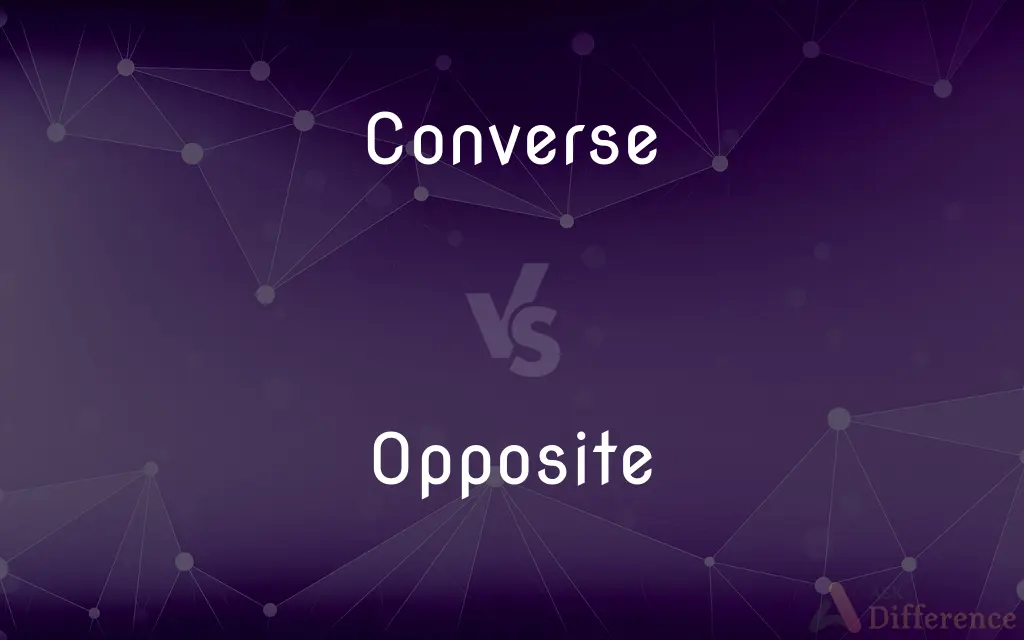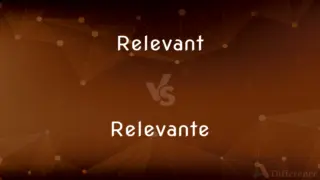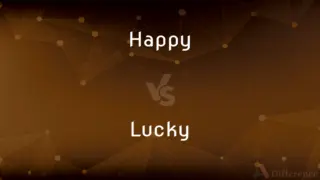Converse vs. Opposite — What's the Difference?
By Fiza Rafique & Urooj Arif — Updated on April 1, 2024
Converse refers to a statement that reverses the terms of another statement, maintaining logical equivalence, while opposite denotes a position or concept diametrically different or contrary in nature.

Difference Between Converse and Opposite
Table of Contents
ADVERTISEMENT
Key Differences
The term "converse" in logic and mathematics refers to a statement derived by reversing the terms of an original statement, often preserving the logical relationship. For example, if the original statement is "All cats are animals," its converse would be "All animals are cats," which may not always be true, demonstrating that the validity of a converse can vary. In contrast, "opposite" is used to describe positions, directions, or characteristics that are as different as possible from each other on a given spectrum. For example, the opposite of "up" is "down," and the opposite of "good" is "bad."
Converse statements are particularly relevant in formal logic and mathematics, where they are used to explore the relationships between propositions and their components. The accuracy or truth of a converse statement depends on the nature of the original statement; not all converses hold true under logical scrutiny. Opposites, however, are more broadly applicable across various contexts, including everyday language, where they refer to concepts or entities that are diametrically contrary to one another without necessarily implying a logical relationship.
While the concept of converse involves a specific structural alteration of statements (swapping the subject and predicate or terms in a given proposition), opposites are identified by their inherent contrast in meaning or position. This fundamental difference means that while converse statements require a logical or relational foundation, opposites are recognized by their intrinsic opposition in qualities, values, or positions.
The application of "converse" is more confined to analytical, logical, or mathematical discussions, emphasizing a structured approach to understanding relationships between statements. In contrast, "opposite" finds use in a wide array of disciplines, including physics (e.g., opposite forces), mathematics (e.g., negative numbers as opposites of positive numbers), and everyday language, highlighting a more intuitive understanding of diametrical difference.
Understanding the distinction between converse and opposite is crucial in various fields of study, as it aids in correctly interpreting the nature of relationships between concepts, statements, or entities. While the converse of a statement requires consideration of logical validity, identifying opposites involves recognizing fundamental differences in characteristics or positions, underscoring the diverse ways in which we understand and categorize the world around us.
ADVERTISEMENT
Comparison Chart
Definition
A statement made by reversing the terms of another.
A position or concept diametrically different or contrary.
Application
Logic and mathematics, analyzing statement relationships.
Various contexts, indicating inherent contrast.
Validity
Depends on the original statement's logical structure.
Inherently recognized by contrast in meaning or position.
Structural Requirement
Swapping the subject and predicate or terms.
Identified by intrinsic opposition in qualities or values.
Use
Analytical discussions on logical or relational foundation.
Broad usage across disciplines and everyday language.
Compare with Definitions
Converse
Application in Mathematics.
In geometry, the converse of a theorem can provide insights but requires proof.
Opposite
Broad Applicability.
The concept of opposites applies from physics (opposite forces) to everyday language.
Converse
Logical Structure.
The converse of If it rains, the ground is wet is If the ground is wet, it rained, illustrating logical reversal.
Opposite
Fundamental Contrast.
Opposites like hot and cold illustrate clear, inherent contrasts.
Converse
Relationship Exploration.
Exploring converses helps in understanding the relationships between logical propositions.
Opposite
Diametrical Difference.
The opposite of joy is often considered sadness, highlighting diametrical emotional states.
Converse
Validity in Logic.
Converse statements must be evaluated for truth, as reversing terms doesn't guarantee validity.
Opposite
Intuitive Understanding.
Identifying opposites is often intuitive, based on understanding of inherent differences.
Converse
Analytical Thinking.
Understanding converse statements enhances analytical skills in formal logic.
Opposite
Contrary Positions.
In debates, opposite viewpoints are presented to explore contrasting perspectives.
Converse
To engage in an exchange of thoughts and feelings by means of speech or sign language.
Opposite
Placed or located directly across from something else or from each other
Opposite sides of a building.
Converse
(Archaic) To interact socially with others; associate.
Opposite
Facing the other way; moving or tending away from each other
Opposite directions.
Converse
An interchange of thoughts and feelings by means of speech or sign language; conversation.
Opposite
Altogether different, as in nature, quality, or significance
The effect of the medication was opposite to that intended.
Converse
Social interaction.
Opposite
Sharply contrasting; antithetical
Had opposite views on the subject.
Converse
Something that has been reversed; an opposite.
Opposite
Growing in pairs on either side of a stem
Opposite leaves.
Converse
(Logic) A proposition obtained by conversion.
Opposite
Arranged on the same radius as another part, as stamens and petals.
Converse
Reversed, as in position, order, or action; contrary.
Opposite
One that is opposite or contrary to another.
Converse
To talk; to engage in conversation.
Opposite
An opponent or antagonist.
Converse
(followed by with) To keep company; to hold intimate intercourse; to commune.
Opposite
An antonym.
Converse
(obsolete) To have knowledge of (a thing), from long intercourse or study.
Opposite
In an opposite position
They sat opposite at the table.
Converse
Free verbal interchange of thoughts or views; conversation; chat.
Opposite
Across from or facing
Parked the car opposite the bank.
Converse
The opposite or reverse.
Opposite
In a complementary dramatic role to
He played opposite her.
Converse
(logic) Of a proposition or theorem of the form: given that "If A is true, then B is true", then "If B is true, then A is true.".
All trees are plants, but the converse, that all plants are trees, is not true.
Opposite
Located directly across from something else, or from each other.
She saw him walking on the opposite side of the road.
Converse
(semantics) One of a pair of terms that name or describe a relationship from opposite perspectives; converse antonym; relational antonym.
Opposite
(botany) Of leaves and flowers, positioned directly across from each other on a stem.
Converse
Opposite; reversed in order or relation; reciprocal
A converse proposition
Opposite
Facing in the other direction.
They were moving in opposite directions.
Converse
To keep company; to hold intimate intercourse; to commune; - followed by with.
To seek the distant hills, and there converseWith nature.
Conversing with the world, we use the world's fashions.
But to converse with heaven -This is not easy.
Opposite
Extremely different; inconsistent; contrary; repugnant; antagonistic.
Converse
To engage in familiar colloquy; to interchange thoughts and opinions in a free, informal manner; to chat; - followed by with before a person; by on, about, concerning, etc., before a thing.
CompanionsThat do converse and waste the time together.
We had conversed so often on that subject.
Opposite
Something opposite or contrary to something else.
Converse
To have knowledge of, from long intercourse or study; - said of things.
According as the objects they converse with afford greater or less variety.
Opposite
A person or thing that is entirely different from or the reverse of someone or something else; used to show contrast between two people or two things.
She is the opposite of her ex-boyfriend who abused her both physically and verbally nearly every day for five years. She now works as an advocate and supportive listener for others who have endured abusive relationships.
Converse
Frequent intercourse; familiar communion; intimate association.
"T is but to holdConverse with Nature's charms, and view her stores unrolled.
Opposite
An opponent.
Converse
Familiar discourse; free interchange of thoughts or views; conversation; chat.
Formed by thy converse happily to steerFrom grave to gay, from lively to severe.
Opposite
An antonym.
"Up" is the opposite of "down".
Converse
A proposition which arises from interchanging the terms of another, as by putting the predicate for the subject, and the subject for the predicate; as, no virtue is vice, no vice is virtue.
Opposite
(mathematics) An additive inverse.
Converse
A proposition in which, after a conclusion from something supposed has been drawn, the order is inverted, making the conclusion the supposition or premises, what was first supposed becoming now the conclusion or inference. Thus, if two sides of a sides of a triangle are equal, the angles opposite the sides are equal; and the converse is true, i.e., if these angles are equal, the two sides are equal.
Opposite
In an opposite position.
I was on my seat and she stood opposite.
Where's the bus station? -Over there, just opposite.
Converse
Turned about; reversed in order or relation; reciprocal; as, a converse proposition.
Opposite
Facing, or across from.
He lives opposite the pub.
Converse
A proposition obtained by conversion
Opposite
In a complementary role to.
He played opposite Marilyn Monroe.
Converse
Carry on a conversation
Opposite
(television) On another channel at the same time.
The game show Just Men! aired opposite The Young and the Restless on CBS.
Converse
Of words so related that one reverses the relation denoted by the other;
`parental' and `filial' are converse terms
Opposite
Placed over against; standing or situated over against or in front; facing; - often with to; as, a house opposite to the Exchange; the concert hall and the state theater stood opposite each other on the plaza.
Converse
Turned about in order or relation;
Transposed letters
Opposite
Situated on the other end of an imaginary line passing through or near the middle of an intervening space or object; - of one object with respect to another; as, the office is on the opposite side of town; - also used both to describe two objects with respect to each other; as, the stores were on opposite ends of the mall.
Opposite
Extremely different; inconsistent; contrary; repugnant; antagonistic.
Novels, by which the reader is misled into another sort of pleasure opposite to that which is designed in an epic poem.
Particles of speech have divers, and sometimes almost opposite, significations.
Opposite
Set over against each other, but separated by the whole diameter of the stem, as two leaves at the same node.
Opposite
One who opposes; an opponent; an antagonist.
The opposites of this day's strife.
Opposite
That which is opposed or contrary in character or meaning; as, sweetness and its opposite; up is the opposite of down.
The virtuous man meets with more opposites and opponents than any other.
Opposite
Two words that express opposing concepts;
To him the opposite of gay was depressed
Opposite
A relation of direct opposition;
We thought Sue was older than Bill but just the reverse was true
Opposite
A contestant that you are matched against
Opposite
Something inverted in sequence or character or effect;
When the direct approach failed he tried the inverse
Opposite
Being directly across from each other; facing;
And I on the opposite shore will be, ready to ride and spread the alarm
We lived on opposite sides of the street
At opposite poles
Opposite
Of leaves etc; growing in pairs on either side of a stem;
Opposite leaves
Opposite
Moving or facing away from each other;
Looking in opposite directions
They went in opposite directions
Opposite
Altogether different in nature or quality or significance;
The medicine's effect was opposite to that intended
It is said that opposite characters make a union happiest
Opposite
Characterized by opposite extremes; completely opposed;
In diametric contradiction to his claims
Diametrical (or opposite) points of view
Opposite meanings
Extreme and indefensible polar positions
Opposite
Directly facing each other;
The two photographs lay face-to-face on the table
Lived all their lives in houses face-to-face across the street
They sat opposite at the table
Common Curiosities
Can the converse of a statement always be considered true?
No, the converse of a statement isn't always true; its validity depends on the logical structure of the original statement.
What are examples of opposites?
Examples include "up" and "down," "good" and "bad," indicating clear, inherent contrasts.
What is a converse statement?
A converse statement is one where the terms of an original statement are reversed, maintaining a logical relationship but requiring validation for truth.
How do opposites differ from converses?
Opposites refer to diametrically different or contrary concepts or positions, without necessarily involving a logical reversal of terms.
Why are opposites important in language and communication?
Opposites enhance clarity and understanding by highlighting clear contrasts between concepts, aiding in effective communication.
How is the concept of converse used in mathematics?
In mathematics, converse statements, especially in theorems, are explored for logical relationships and require proof for their validity.
Are opposites subjective?
While some opposites are universally recognized, the perception of what constitutes an opposite can vary based on cultural or personal viewpoints.
How do converses contribute to logical analysis?
Converses allow for a deeper exploration of logical relationships and the testing of assumptions in statements.
Is the opposite of a complex concept always clear?
For complex concepts, identifying an opposite may require nuanced understanding, as contrasts can be multi-dimensional.
What role does context play in determining converses and opposites?
Context is crucial; it shapes the interpretation of converses in logic and mathematics, and it defines the inherent contrast in opposites.
How can one identify a converse statement?
By reversing the terms of an original statement and examining its logical relationship and validity.
Can a concept have multiple opposites?
Yes, depending on context and interpretation, a concept can have multiple opposites reflecting different aspects of diametrical contrast.
How are opposites used in educational settings?
Opposites are used to teach basic concepts, enhance vocabulary, and develop critical thinking skills through contrast.
What challenges arise in proving the converse of a theorem?
Proving a converse often requires establishing a separate logical foundation, as the truth of the converse isn't guaranteed by the original theorem.
In what ways do converses and opposites enhance understanding?
They enhance understanding by providing different perspectives on relationships between concepts, encouraging analytical thinking, and clarifying contrasts.
Share Your Discovery

Previous Comparison
Relevant vs. Relevante
Next Comparison
Happy vs. LuckyAuthor Spotlight
Written by
Fiza RafiqueFiza Rafique is a skilled content writer at AskDifference.com, where she meticulously refines and enhances written pieces. Drawing from her vast editorial expertise, Fiza ensures clarity, accuracy, and precision in every article. Passionate about language, she continually seeks to elevate the quality of content for readers worldwide.
Co-written by
Urooj ArifUrooj is a skilled content writer at Ask Difference, known for her exceptional ability to simplify complex topics into engaging and informative content. With a passion for research and a flair for clear, concise writing, she consistently delivers articles that resonate with our diverse audience.















































